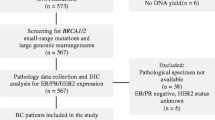Abstract
A majority of breast cancer (BC) molecular subtype in BRCA1 variants carriers is triple-negative type. In contrast, human epidermal growth factor 2 (HER2)-positive BC among carriers of BRCA1 variants is rarely reported. A 42-year-old woman who previously received adjuvant endocrine therapy against left BC developed a left BC relapse and a right new primary BC. Her mother had BC and ovary cancer, and her cousin had BC. Genetic testing revealed a pathogenic large deletion of exons 1–8 in BRCA1. She was diagnosed with hereditary breast and ovary cancer and underwent bilateral mastectomy. The molecular subtypes of her right and left primary BC were HER2-enriched type and luminal-HER2 type, respectively. After completion of adjuvant therapy for right BC, risk-reducing salpingo-oophorectomy (RRSO) is planned. The present case makes us consider the frequency of BRCA1 large rearrangements in Japanese, the association between HER2 amplification and BRCA1 variants, and the optimal timing of RRSO in patients receiving adjuvant therapy for BC.



Similar content being viewed by others
References
Kuchenbaecker KB, Hopper JL, Barnes DL et al (2017) Risks of breast, ovarian, and contralateral breast cancer for BRCA1 and BRCA2 mutation carriers. JAMA 317:2402–2416
Noguchi S, Kasugai T, Miki Y et al (1999) Clinicopathologic analysis of BRCA1- or BRCA2-associated hereditary breast carcinoma in Japanese women. Cancer 85:2200–2205
Yoshida R, Watanabe C, Yokoyama S et al (2019) Analysis of clinical characteristics of breast cancer patients with the Japanese founder mutation BRCA1 L63X. Oncotarget 10:3276–3284
Momozawa Y, Iwasaki Y, Parsonset MT et al (2018) Germline pathogenic variants of 11 breast cancer genes in 7,051 Japanese patients and 11,241 controls. Nat Commun 9:4083
Pylkäs K, Erkko H, Nikkilä J et al (2008) Analysis of large deletions in BRCA1, BRCA2 and PALB2 genes in Finnish breast and ovarian cancer families. BMC Cancer 8:146
Gad S, Caux-Moncoutier V, Pagès-Berhouet S et al (2002) Significant contribution of large BRCA1 gene rearrangements in 120 French breast and ovarian cancer families. Oncogene 21:6841–6847
James PA, Sawyer S, Boyle S et al (2015) Large genomic rearrangements in the familial breast and ovarian cancer gene BRCA1 are associated with an increased frequency of high risk features. Fam Cancer 14:287–295
Nakamura S, Takahashi M, Tozaki M et al (2015) Prevalence and differentiation of hereditary breast and ovarian cancers in Japan. Breast Cancer 22:462–468
Lang GT, Shi JX, Hu X et al (2017) The spectrum of BRCA mutations and characteristics of BRCA-associated breast cancers in China: screening of 2991 patients and 1043 controls by next-generation sequencing. Int J Cancer 141:129–142
Mavaddat N, Barrowdale D, Andrulis IL et al (2012) Pathology of breast and ovarian cancers among BRCA1 and BRCA2 mutation carriers: results from the consortium of investigators of modifiers of BRCA1/2 (CIMBA). Cancer Epidemiol Biomarkers Prev 21:134–147
Japanese Breast Cancer Society (2020) National breast cancer cases resister of 2017. http://jbcs.gr.jp/member/ Accessed Oct 2020
NCCN org. (2020) NCCN clinical practice guidelines in oncology (NCCN guidelines) Breast Cancer, Version 5-2020, https://www2.tri-kobe.org/nccn/guideline/breast/english/breast.pdf. Accessed Feb 2021
Schrijver WAM, Suijkerbuijk KPM, van Glis CH et al (2018) Receptor conversion in distant breast cancer metastases: a systematic review and meta-analysis. J Natl Cancer Inst 110:568–580
National Center for Biotechnology Information. US National Library of Medicine. NIH. https://www.ncbi.nlm.nih.gov/genome/gdv/browser/gene/?id=2064. Accessed Feb 2021
Antoniou A, Pharoah PDP, Narod S et al (2003) Average risks of breast and ovarian cancer associated with BRCA1 or BRCA2 mutations detected in case Series unselected for family history: a combined analysis of 22 studies. Am J Hum Genet 72:1117–1130
NCCN org. (2019) NCCN Clinical Practice Guidelines in Oncology (NCCN guidelines) Genetic/familial high-risk assessment: Breast and Ovarian, Version 3–2019, https://www2.tri-kobe.org/nccn/guideline/gynecological/english/genetic_familial.html, Accessed Oct 2020
Moja L, Tagliabue L, Balduzzi S et al (2012) Trastuzumab containing regimens for early breast cancer. Cochrane Database Syst Rev. 4:CD006243
Author information
Authors and Affiliations
Contributions
NU was the physician in charge of the present case, designed the study, and wrote the manuscript. MT contributed to genetic counseling and interpretation of data. TS contributed to review of the manuscript. YM was the previous physician in charge of the present case and reviewed the manuscript. MY contributed to pathological examination. All authors approved the content of this manuscript.
Corresponding author
Ethics declarations
Conflict of interest
The authors declare that they have no conflicts of interest.
Statement of human right
The study has been performed in accordance with the ethical standards as laid down in the 1964 Declaration of Helsinki and its later amendments or comparable ethical standards.
Ethical approval
Since this is a case report, approval of our institution’s ethical board was not required.
Informed consent
Informed consent was obtained from the patient described in this report.
Additional information
Publisher's Note
Springer Nature remains neutral with regard to jurisdictional claims in published maps and institutional affiliations.
About this article
Cite this article
Uchida, N., Takeshita, M., Suda, T. et al. HER2-positive breast cancer in a germline BRCA1 gene large deletion carrier. Int Canc Conf J 10, 181–185 (2021). https://doi.org/10.1007/s13691-021-00481-3
Received:
Accepted:
Published:
Issue Date:
DOI: https://doi.org/10.1007/s13691-021-00481-3




